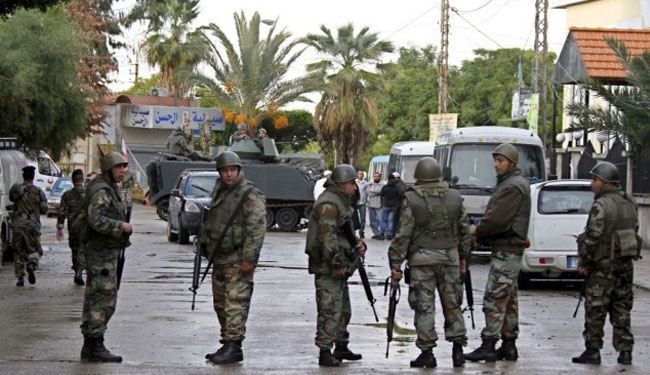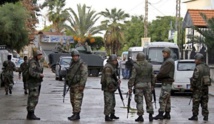The fighting caused major damage to the impoverished Sunni district of Bab al-Tebbaneh, which Islamists accused of ties to Al-Qaeda had used as their stronghold.
On Monday morning, the army was in full control of the Islamist bastion as troops moved in without facing any resistance, a military spokesman told AFP.
"The army has taken over Bab al-Tebbaneh," said the spokesman, adding troops had captured 162 militants since Friday.
The army urged militants still at large to turn themselves in.
An AFP correspondent who briefly accompanied troops into the district said no militants could be seen and that the streets were largely deserted.
The soldiers carried out house-to-house searches and made several weapons seizures.
A 72-year-old woman said she had never before been forced out of Bab al-Tebbaneh, "not even during the civil war" that raged in Lebanon from 1975 to 1990.
"But this time, I had to flee my house, along with my five grandchildren. I am in charge of them, because their father is in jail," said Umm Mohammed Jaaburi, wearing a blue nightgown and white headscarf.
"The violence was unprecedented," she said.
Thousands of civilians poured out of the neighbourhood, which is home to some 100,000 residents, during a lull in fighting late on Sunday.
- 'Armed men on rooftops' -
"I saw armed men move through the houses and on the rooftops, shooting at the army, which fired back using mortars," said Jaaburi.
"A building in front of ours was filled with flames, and the smoke reached our house," she said.
Burnt-out vehicles littered the edges of Bab al-Tebbaneh, and several homes and shops had suffered extensive fire damage.
The fighting in Bab al-Tebbaneh followed deadly violence in the historic heart of Tripoli on Friday.
Washington praised the courage of the soldiers involved in the clashes, while also backing the Lebanese government.
"We condemn those who seek to sow chaos in Lebanon and are confident that the Lebanese people will persevere if they stand united in the face of this threat," said State Department spokeswoman Jen Psaki.
- 'Refugee in own country' -
Schools and universities were closed across Tripoli on Monday because of the violence.
The coastal city has seen repeated clashes between Sunni militants sympathetic to rebel fighters in neighbouring Syria and Alawites loyal to the Damascus regime.
The army has also come under growing attack by Sunnis who accuse it of colluding with Shiite militant group Hezbollah in its intervention in the Syrian conflict on the side of the regime.
In August, a deadly battle in the Sunni enclave of Arsal near the Syrian border ended with jihadists who had streamed into Lebanon from Syria withdrawing after a truce, while taking hostage 30 soldiers and policemen.
Three of those soldiers have since been executed, and Syria's Al-Qaeda affiliate Al-Nusra Front had threatened to kill a fourth because of the Tripoli violence.
The group issued a statement later Monday saying it had decided to "stop the killing" of the soldier after fighting in Tripoli subsided.
Residents of Bab al-Tebbaneh and other parts of Tripoli have long felt they suffer the worst of the country's political instability.
"We always pay the price," said Khaled Breiss, a father of three who was forced to flee Bab al-Tebbaneh.
"I am among the people who welcomed a Syrian refugee family in my own home. How can it be that I am now a refugee in my own country?"
------------------------------------------------------------------------------------------------------------------------
On Monday morning, the army was in full control of the Islamist bastion as troops moved in without facing any resistance, a military spokesman told AFP.
"The army has taken over Bab al-Tebbaneh," said the spokesman, adding troops had captured 162 militants since Friday.
The army urged militants still at large to turn themselves in.
An AFP correspondent who briefly accompanied troops into the district said no militants could be seen and that the streets were largely deserted.
The soldiers carried out house-to-house searches and made several weapons seizures.
A 72-year-old woman said she had never before been forced out of Bab al-Tebbaneh, "not even during the civil war" that raged in Lebanon from 1975 to 1990.
"But this time, I had to flee my house, along with my five grandchildren. I am in charge of them, because their father is in jail," said Umm Mohammed Jaaburi, wearing a blue nightgown and white headscarf.
"The violence was unprecedented," she said.
Thousands of civilians poured out of the neighbourhood, which is home to some 100,000 residents, during a lull in fighting late on Sunday.
- 'Armed men on rooftops' -
"I saw armed men move through the houses and on the rooftops, shooting at the army, which fired back using mortars," said Jaaburi.
"A building in front of ours was filled with flames, and the smoke reached our house," she said.
Burnt-out vehicles littered the edges of Bab al-Tebbaneh, and several homes and shops had suffered extensive fire damage.
The fighting in Bab al-Tebbaneh followed deadly violence in the historic heart of Tripoli on Friday.
Washington praised the courage of the soldiers involved in the clashes, while also backing the Lebanese government.
"We condemn those who seek to sow chaos in Lebanon and are confident that the Lebanese people will persevere if they stand united in the face of this threat," said State Department spokeswoman Jen Psaki.
- 'Refugee in own country' -
Schools and universities were closed across Tripoli on Monday because of the violence.
The coastal city has seen repeated clashes between Sunni militants sympathetic to rebel fighters in neighbouring Syria and Alawites loyal to the Damascus regime.
The army has also come under growing attack by Sunnis who accuse it of colluding with Shiite militant group Hezbollah in its intervention in the Syrian conflict on the side of the regime.
In August, a deadly battle in the Sunni enclave of Arsal near the Syrian border ended with jihadists who had streamed into Lebanon from Syria withdrawing after a truce, while taking hostage 30 soldiers and policemen.
Three of those soldiers have since been executed, and Syria's Al-Qaeda affiliate Al-Nusra Front had threatened to kill a fourth because of the Tripoli violence.
The group issued a statement later Monday saying it had decided to "stop the killing" of the soldier after fighting in Tripoli subsided.
Residents of Bab al-Tebbaneh and other parts of Tripoli have long felt they suffer the worst of the country's political instability.
"We always pay the price," said Khaled Breiss, a father of three who was forced to flee Bab al-Tebbaneh.
"I am among the people who welcomed a Syrian refugee family in my own home. How can it be that I am now a refugee in my own country?"
------------------------------------------------------------------------------------------------------------------------









 Home
Home Politics
Politics











